#calcium supplements products
Text
#dairy products near me#gir cow milk in Mumbai#a2 cow ghee#best a2 milk in Pune#calcium supplements products#ayurvedic immunity booster products#Aphra
0 notes
Text
ProDentim
Supplements
A Smile Saver: My Experience with ProDentim Supplements
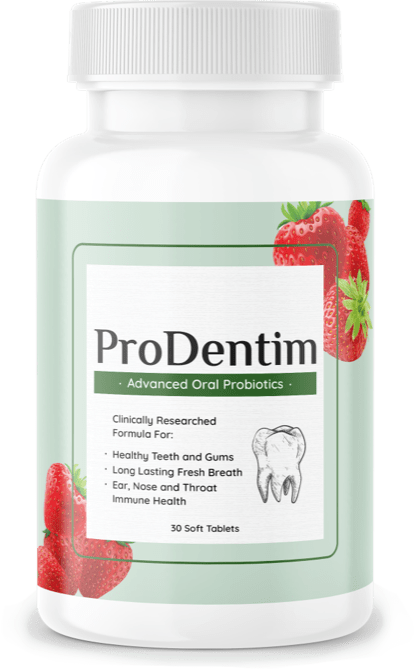
Brushing twice a day and flossing regularly are the cornerstones of good oral hygiene, but I'd always felt like I could be doing more for my teeth and gums. After a bit of research, I decided to try ProDentim supplements, and I'm thrilled I did!
A Natural Boost for My Smile
ProDentim is a dental health supplement that contains a blend of probiotic strains and other beneficial ingredients. Probiotics are live bacteria that can improve gut health, and recent research suggests they may also play a role in oral health. I was drawn to ProDentim's natural approach to supporting healthy teeth and gums.
Easy to Take and Gentle on the System
The ProDentim supplements come in easy-to-swallow capsules. I take one each morning with breakfast. They're flavourless and haven't caused any stomach upset, which is a plus for me as some supplements can be a bit harsh.
A Brighter, Fresher Smile
Since taking ProDentim, I've noticed a few positive changes in my oral health. My breath feels fresher throughout the day, and my gums seem less puffy and irritated. I'm also hoping that the probiotics in ProDentim will help to prevent future cavities and gum problems. It's still early days, but I'm definitely feeling more confident about my smile.
Would I Recommend ProDentim?
Absolutely! If you're looking for a natural way to support your oral health, I highly recommend giving ProDentim a try. It's easy to take, gentle on the system, and seems to be making a positive difference in my smile. It's important to note that I'm not a medical professional, so it's always a good idea to speak to yourdentist before starting any new supplements. But for me, ProDentim has been a great addition to my oral hygiene routine.
#ProDentim#Supplements#ProDentim supplement#Dental hygiene#Dental care#Super dental care#Healthy gum and teeth#Toothtonic#Briterteeth#Toothwhitener#Toothproduct#Best tooth product#artists on tumblr#michael cera#donald trump#Anticavities#Antipyrrhoea#Strong tooth#Strong teeth#Healthy teeth#Calcium for teeth#Minerals for teeth
0 notes
Text
PowerBite: Strengthening My Smile and My Recommendations
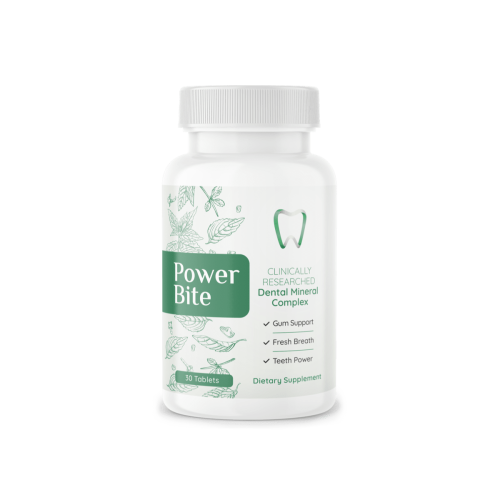
As someone who prioritizes oral health, I'm always on the lookout for innovative products that can support strong teeth and healthy gums. While I practice good oral hygiene and have regular dental checkups, I was intrigued by PowerBite, a dental supplement claiming to utilize "thermal calcium" for enhanced benefits. Here's my experience with PowerBite:
A Unique Approach to Calcium Supplementation
The concept of "thermal calcium" initially piqued my curiosity. PowerBite highlights a unique processing method that supposedly enhances calcium absorption. While I'm not a scientist, the explanation resonated with my desire to go beyond basic calcium supplements. After some online research on the potential benefits of this processing method, I decided to give PowerBite a try.
Improved Enamel Strength and Reduced Sensitivity
Since incorporating PowerBite into my routine, I've noticed a positive change in the overall strength of my teeth. My dentist even commented on a slight improvement in enamel health during my last checkup. Additionally, I used to experience occasional sensitivity to cold drinks. Thankfully, that discomfort has become a thing of the past since taking PowerBite. Whether due to the thermal calcium or the combination of ingredients, I'm happy with the results.
Fresh Breath and a Brighter Smile
Beyond the benefits for my teeth, PowerBite has also had a positive impact on my breath. The supplement contains additional ingredients known for their breath-freshening properties, and I've noticed a noticeable difference in overall freshness throughout the day. This bonus benefit, coupled with the potential for stronger teeth, makes PowerBite an attractive option for anyone seeking a well-rounded oral health solution.
Convenient and Easy to Integrate into My Routine
PowerBite comes in chewable tablet form, making it a convenient and pleasant addition to my daily routine. The tablets have a mild, minty flavour and are easy to take on the go. The recommended dosage is just two tablets a day, making it effortless to incorporate into my existing regimen.
A Valuable Addition to My Oral Health Routine
While maintaining good oral health requires a combination of factors, including brushing, flossing, and regular dental checkups, PowerBite has become a valuable addition to my routine. The unique "thermal calcium" approach, coupled with the additional breath-freshening ingredients, has demonstrably improved the strength, health, and overall comfort of my teeth. If you're looking for a convenient and potentially effective way to support your oral health, I highly recommend giving PowerBite a try. Remember, consulting with your dentist before starting any new supplement regimen is always a good idea.
0 notes
Text

💪 Discover the power of calcium supplements in our latest infographic! From stronger bones to a healthier heart, these tiny tablets are packed with benefits. #CalciumSupplements #HealthyBones #HeartHealth #Wellness #PMSRelief #StrongMuscles 💊🦴❤️
0 notes
Text
Looking for a natural source of calcium, potassium, and Vitamin B? Discover the power of Spirulina Capsules. Why wait? Buy now!
#Spirulina#Spirulina Capsules#Natural Supplements#Calcium Source#Potassium Benefits#Vitamin B Health#Nutritional Supplements#Wellness Products#Buy Spirulina
0 notes
Text
The Multi-Benefits of Bone Plus Supplements: Supporting Bone Health and Overall Wellness
Bone Plus supplements, which typically include calcium, vitamin D, and magnesium, can offer several benefits for maintaining and supporting bone health. These include:
Helping to prevent bone loss: Calcium and magnesium are essential minerals for maintaining strong and dense bones. A Bone Plus supplement can help to ensure that you are getting enough of these minerals to prevent bone loss and reduce the risk of osteoporosis.
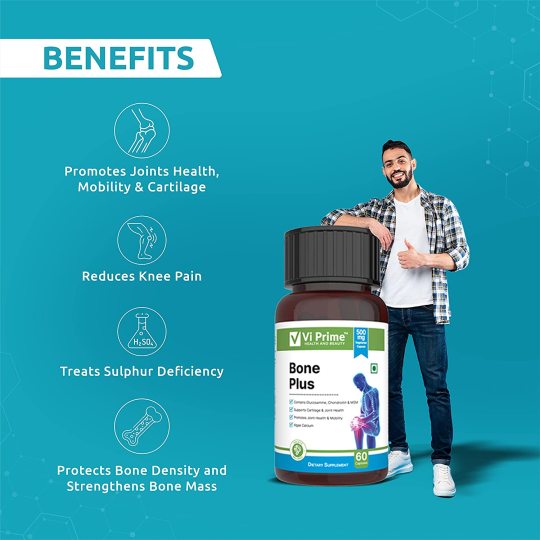
Improving calcium absorption: Vitamin D is important for the body's ability to absorb calcium. Taking a Bone Plus supplement that includes vitamin D can help to improve the absorption of calcium and ensure that it is being used to build and maintain strong bones.
Supporting bone health throughout life: Bone health is important throughout life, and a Bone Plus supplement can help to support bone health in all ages. It can be especially important for older adults, postmenopausal women, and people who have a high risk of osteoporosis.
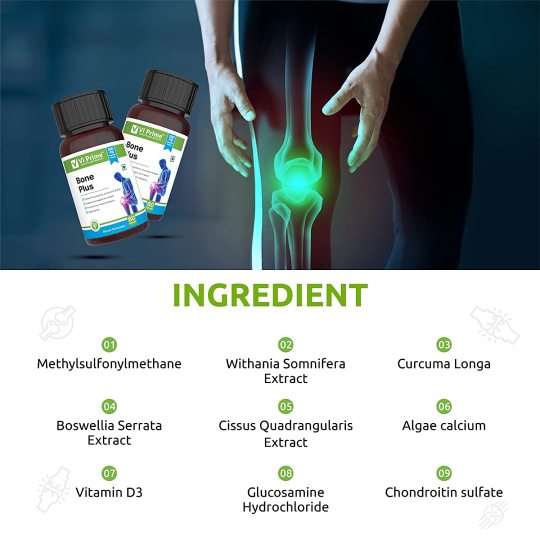
Improving overall health: Calcium, vitamin D, and magnesium also have other health benefits beyond just supporting bone health. Calcium and magnesium can support cardiovascular health and magnesium can improve sleep, reduce stress and anxiety. Vitamin D can also help to boost the immune system and protect against certain diseases.
It's important to note that taking a Bone Plus supplement should not be used as a replacement for a healthy diet and regular exercise, and it's always best to consult with a healthcare professional before starting any new supplement regimen.
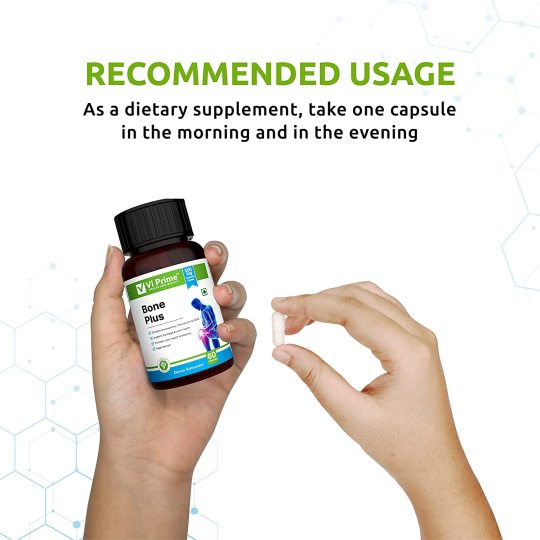
KEY INGREDIENTS: Vi Prime Bone plus contains Boswellia serrata. It is a resin from the Boswellia tree. It acts as a natural medication for inflammation. Its anti-inflammatory properties can assist with joint support
Bone Plus Calcium Capsules
Glucosamine chondroitin supplements
Ashwagandha supplement for sleep
Health Care Products
0 notes
Text
Foods You Can Eat Instead of Taking Vitamins and Supplements 🍎🥥🥦🥑🍌
Vitamin A: Carrots, sweet potatoes, spinach, kale.
B Vitamins: Whole grains, meat, eggs, nuts, legumes.
Vitamin B1 (Thiamine): Whole grains, legumes, nuts, pork, fortified cereals.
Vitamin B2 (Riboflavin): Dairy products, lean meats, almonds, leafy greens.
Vitamin B3 (Niacin): Poultry, fish, nuts, legumes, whole grains.
Vitamin B5 (Pantothenic Acid): Meat, poultry, eggs, avocado, whole grains.
B6: Chicken, turkey, fish, bananas, chickpeas.
Folate (Vitamin B9): Leafy greens, legumes, citrus fruits, fortified grains.
Vitamin B12: Animal products (meat, fish, dairy), fortified plant-based foods.
Vitamin C: Citrus fruits, strawberries, bell peppers.
Vitamin D: Fatty fish (salmon, mackerel), fortified dairy products, sunlight.
Vitamin E: Sunflower seeds, almonds, vegetable oils, nuts, spinach, broccoli.
Vitamin F (Essential Fatty Acids): Fatty fish, flaxseeds, chia seeds, walnuts.
Vitamin H (Biotin): Eggs, nuts, sweet potatoes, salmon, avocado.
Vitamin K: Leafy greens (kale, spinach), broccoli, Brussels sprouts.
Vitamin K2: Fermented foods (natto, cheese), animal products, leafy greens.
Vitamin L1 (Anthranilic Acid): Cruciferous vegetables (cabbage, cauliflower), legumes.
Vitamin P (Bioflavonoids): Citrus fruits, berries, onions, green tea.
Vitamin Q (Ubiquinone): Fatty fish, organ meats, spinach, cauliflower.
Vitamin T (L-carnitine): Red meat, poultry, fish, dairy products.
Vitamin U (S-Methylmethionine): Cabbage, broccoli, Brussels sprouts.
Betaine: Beets, spinach, whole grains, seafood.
Boron: Fruits (apples, pears), legumes, nuts, avocado.
Calcium: Dairy products, leafy greens (kale, collard greens), almonds.
Carnosine: Beef, poultry, fish.
Carnitine: Red meat, dairy products, fish.
Catechins: Green tea, black tea, dark chocolate.
Choline: Eggs, liver, beef, broccoli, soybeans.
Creatine: Red meat, fish, poultry.
Chromium: Broccoli, whole grains, nuts, brewer's yeast.
Chondroitin: Cartilage-rich foods (bone broth, connective tissue of meat).
Copper: Shellfish, nuts, seeds, organ meats, lentils.
Coenzyme Q10 (CoQ10): Fatty fish, organ meats, nuts, soybean oil.
Ellagic Acid: Berries (strawberries, raspberries), pomegranates.
Glucosinolates: Cruciferous vegetables (cabbage, broccoli, cauliflower).
Glucosamine: Shellfish (shrimp, crab), bone broth, animal connective tissues.
Glutamine: Dairy products, meat, poultry, cabbage.
Inositol: Citrus fruits, beans, nuts, whole grains.
Iodine: Seafood, iodized salt, dairy products.
Iron: Red meat, poultry, beans, lentils, spinach.
L-Theanine: Mushrooms, black tea, white tea, guayusa.
Lignans: Flaxseeds, whole grains, cruciferous vegetables.
Lutein and Zeaxanthin: Leafy greens (spinach, kale), corn, eggs.
Lycopene: Tomatoes, watermelon, pink grapefruit.
Magnesium: Spinach, nuts, seeds, whole grains, beans.
Manganese: Nuts, seeds, whole grains, leafy greens, tea.
Melatonin: Cherries, grapes, tomatoes.
Omega-3 fatty acids: Flaxseeds, chia seeds, walnuts, fatty fish.
PABA (Para-Aminobenzoic Acid): Whole grains, eggs, organ meats.
Pantothenic Acid (Vitamin B5): Meat, poultry, fish, whole grains, avocado
Pectin: Apples, citrus fruits, berries, pears.
Phosphorus: Dairy products, meat, poultry, fish, nuts.
Prebiotics: Garlic, onions, leeks, asparagus, bananas (unripe), oats, apples, barley, flaxseeds, seaweed.
Probiotics: Yogurt, kefir, fermented foods (sauerkraut, kimchi).
Potassium: Bananas, oranges, potatoes, spinach, yogurt.
Polyphenols: Berries, dark chocolate, red wine, tea.
Quercetin: Apples, onions, berries, citrus fruits.
Resveratrol: Red grapes, red wine, berries, peanuts.
Rutin: Buckwheat, citrus fruits, figs, apples.
Selenium: Brazil nuts, seafood, poultry, eggs.
Silica: Whole grains, oats, brown rice, leafy greens.
Sulforaphane: Cruciferous vegetables (broccoli, Brussels sprouts), cabbage.
Taurine: Meat, seafood, dairy products.
Theanine: Green tea, black tea, certain mushrooms.
Tyrosine: Meat, fish, dairy products, nuts, seeds.
Vanadium: Mushrooms, shellfish, dill, parsley, black pepper.
Zeatin: Whole grains, legumes, nuts, seeds.
Zinc: Oysters, beef, poultry, beans, nuts, whole grains.
#women health#health and wellness#healthy diet#healthy living#healthy lifestyle#womens health#health#health tips#wellness#levelupjourney#dream girl guide#dream girl tips#dream girl journey#health is wealth#clean girl aesthetic#clean girl#it girl#nutrition#supplements#organic#food#nutrients#healthyhabits#healthy life tips#self love journey#self love#dream life#dream girl
2K notes
·
View notes
Text
Electrolytes and why they're important especially when water f4st!ng:
Electrolytes are electrically charged minerals, such as sodium, potassium, calcium, magnesium, chloride, bicarbonate, and phosphate. They are involved in various physiological processes.
During a water f4st, the body can lose electrolytes through various means, such as urine, sweat, and even through breathing.
Without sufficient intake of electrolytes, the body may experience imbalances that can lead to various health issues including:
muscle cramps, dizziness, weakness, irregular heartbeats, and in severe cases, even life-threatening conditions such as de4th.
Here's a breakdown of each electrolyte and its role in the body:
Sodium (Na+):
Role: Sodium is the primary extracellular cation (positively charged ion) and plays a vital role in maintaining fluid balance and blood pressure. It is essential for nerve impulse transmission and muscle function.
Source: Commonly found in table salt (sodium chloride) and many processed foods.
Potassium (K+):
Role: Potassium is the primary intracellular cation. It helps regulate fluid balance, nerve impulses, muscle contractions (including the heart), and maintains proper cellular function.
Source: Found in various fruits and vegetables, such as bananas, oranges, potatoes, and spinach.
Calcium (Ca2+):
Role: Calcium is essential for maintaining strong bones and teeth. It also plays a key role in muscle contractions, nerve transmission, blood clotting, and cell signaling.
Source: Dairy products, leafy greens, nuts, and fortified non-dairy milk.
Magnesium (Mg2+):
Role: Magnesium is involved in hundreds of enzymatic reactions in the body, including energy production, protein synthesis, muscle and nerve function, and maintaining healthy bones.
Source: Found in nuts, seeds, whole grains, leafy greens, and legumes.
Chloride (Cl-):
Role: Chloride is the major extracellular anion (negatively charged ion) and works closely with sodium to help maintain fluid balance and osmotic pressure in cells.
Source: Commonly found in table salt (sodium chloride) and many processed foods.
Bicarbonate (HCO3-):
Role: Bicarbonate is involved in regulating the body's acid-base balance (pH level) and is a crucial component of the bicarbonate buffering system.
Source: The body produces bicarbonate as part of normal metabolic processes.
Phosphate (HPO42-):
Role: Phosphate is essential for bone and teeth mineralization, energy production (adenosine triphosphate, ATP), and serves as a component of DNA and RNA.
Source: Found in various foods, including meat, dairy products, nuts, and whole grains.
To prevent these complications and support the body during a water f4st, it is crucial to supplement with electrolytes.
Many people who practice prolonged water f4st!ng or intermittent f4st!ng find it helpful to take electrolyte supplements or consume electrolyte-rich drinks to ensure they maintain proper mineral balance throughout the f4!sting period. However, it is essential to consult with a healthcare professional before starting any regimen or supplement routine, as individual needs may vary.
#making a list of signs/symptoms of low electrolytes next#ed not ed sheeran#ed not sheeren#ed no sheeran#disordered eating thoughts#tw ana shit#tw ed diet#ed bllog#anorex14#ana trigger#ana shit#tw ana diary#4norexi4#thin$spo#thinspø#th!n$spo#⭐ving#⭐ve#tw ed rant#ed vent
2K notes
·
View notes
Note
beginner guide to vitamins?
I am uneducated on vitamins and what they do for you, I only know the basics, however I did do research before posting. This is a disclaimer that I am not a doctor, and your general practitioner knows best for you. I made this into an everyday vitamin guide instead, as it is a lot more simpler for me and to avoid misinformation ❀
EVERYDAY GUIDE TO VITAMINS
About vitamins that best support you when consumed on a daily basis! I used food instead of supplements because of no specification.
VITAMIN A
Supports vision, a healthy immune system and cell growth.
Sweet potatoes, carrots, spinach, kale and liver.
Or, look for foods rich in beta-carotene.
B VITAMINS
Support many bodily functions and the proper development your body.
Whole grains, leafy greens, nuts or seeds and legumes.
VITAMIN C
Acts as an antioxidant, helps to heal wounds, supports the immune system and collagen production.
Citrus fruits like oranges, grapefruits or lemons. Strawberries, kiwi, bell peppers and broccoli.
VITAMIN D
Supports bone health, immune system and regulation of moods.
Fatty fish like salmon, mackerel, sardines. Diary products like milk, yoghurt and cheese.
VITAMIN E
Supports skin health and is anti-inflammatory.
Nuts and seeds, spinach and broccoli.
CALCIUM
Helps with muscle contraction, strong teeth and bones and nerve function.
Diary products like milk, yoghurt or cheese. Kale and spinach.
IRON
Supports healthy red blood cell production and energy levels.
Red meat, poultry, fish. Legumes, tofu and spinach.
OMEGA 3 FATTY ACIDS
Anti-inflammatory, support brain function and heart health.
Fatty fishes or seeds.
This post was a bit difficult, if mine wasn’t what you were looking for, here’s one that I would recommend.
#becoming that girl#that girl#glow up#glow up era#health is wealth#health and wellness#health#self healing#green juice girl#healthy eating#healthy living#healthy girl#wellness gir#wellness era
974 notes
·
View notes
Text
Aphra Provides Free Home Delivery of Dairy & Ayurvedic Products
Aphra offers Free Home Delivery of Best Dairy Products, Natural Ayurvedic Products, and seasonal fruits. For More Information visit our Official Website - www.aphra.in
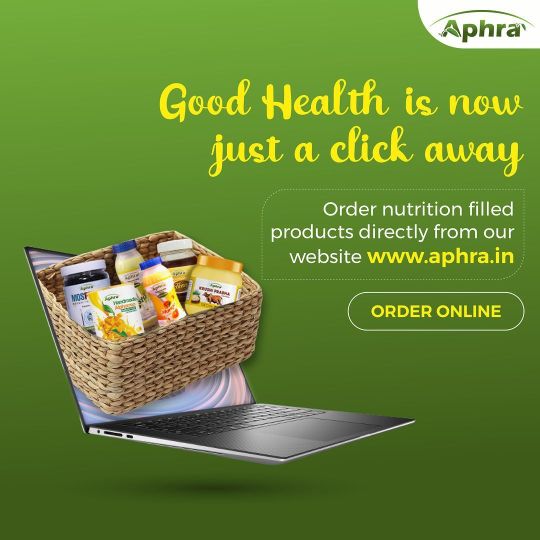
#dairy products near me#gir cow milk in Mumbai#a2 cow ghee#best a2 milk in Pune#calcium supplements products#ayurvedic immunity booster products#Aphra
0 notes
Text
JRWI characters react to your lactose intolerance.
Gillion: What's lactose intolerance???? *DRINKS A GALLON OF MILK AND PROCEEDS TO HAVE SEVERE STOMACH ISSUES*
Jay: Wow it must suck to be you *continues to drink her glass of milk without a care*
Chip: HAH!! *tries to drink milk but it drips out his exposed ribcage* Awe man.........
Goobleck: it okay!! goobleck drink it all already!!!!!
Vyncent: I know how to fix this!!! *dashes over to the sink and pours all the milk down the drain*
William: oh ill just put this away then *goes to walk to the fridge but phases through the floor leaving only the bottle of milk behind*
Dakota: OH NICE I PREFER SOY MILK ANYWAYS IT TASTES SO GOOD, RIGHT??
Ashe; *hands you a can of monster*
Rand: *takes deep inhale of joint and exhales* did you know theyre puttingillegal supplements in milk its this whole conspiracy--
Kian: its okay dude but like where do you get your calcium from then..?
Rolan: Coffee doesn't even taste that good so you're not missing out.
Thanatos: Your biases towards dairy products does not concern me Y/N.
peter; oh wow me too...... we're like. both so intolerant... ..i think i phrased that wrong. nevermind.
rumi: Hm. I see... Did you know some people are into that sort of thing? You know, milking? Not me of course. But.
Exandrofh: I'M INTOLERANT TOWARDS MILK TOO I EXPLODE EVERY COW I SEE
#📚 my posts#💬 inc quotes#just roll with it#jrwi riptide#jrwi prime defenders#jrwi blood in the bayou#jrwi apotheosis
100 notes
·
View notes
Text
My lovely friends, this is a friendly evidence-based post pertaining to the risk reduction of a few well-known health effects of 4n4 and mia. Including: Amenorrhea (loss of regular menstrual period), anaemia, digestive upset, dehydration, electrolyte imbalance, general well-being, and osteoporosis. It is quite a long post, but please let me know if there’s any other information you would like me to cover. 💕
🪐 Vitamins and Supplements:
• A-Z Multivitamin. Is beneficial for supplementation. For example, Vitamin C is a vitally important vitamin for the body’s connective tissues, including the maintenance of healthy bones and teeth, cellular formation and maturation, resistance to infection, and an increased ability to heal. Additionally, B12 contributes to an adequately functioning nervous system, bone marrow, and intestinal tract. It also acts to increase metabolism of protein, carbohydrates, and fats. Finally vitamin B2 when combined with Vitamin A promotes good vision and healthy skin, as well as assists in metabolising proteins and fats at a cellular level.
• Calcium and Vitamin D. Seek a preparation which offers 1000mg of calcium and 10-20mcg (400-800 iu) of vitamin D. Vitamin D increases the bodies efficacy during the absorption, retention, and metabolising of calcium. Calcium of course being vital for bone integrity and imperative for the prevention of osteopenia/osteoporosis.
• Iron. An appropriate iron intake will restore the functionality of red blood cells, allowing the proper oxygen transportation around the body, increase focus, energy, athletic performance, and sleep. Having a sufficient iron store will alleviate some commonly experienced symptoms of low iron including fatigue, dizziness, pallor, and shortness of breath. It may also reduce the sensation of cold hands and feet.
• Potassium and Zinc. A lack of zinc impairs the ability to smell and taste. Connecting this impairment to nose blindness. For example, a lack of a sense of smell and taste may impair one’s own ability to detect their own bad breath, BO, and other unpleasant smells that others may be able to detect.
• Omega 3’s - Fish oil, Krill oil, Hemp oil, or Flaxseed oil. Improper dietary intake, or supplementation of omega 3 fatty acids will result in areas of epidermal (skin) dryness, hyperkeratosis, and hyperpigmentation. As well as the formation large scales expose underlying tissue, which are easily infected. The hair becomes sparse, dry, lusterless, and brittle, with a reddish tinge. Furthermore, nails become brittle and dull, tear production reduces, the tears are also significantly less oily leading to increased evaporation contributing to chronically dry, red, and itchy eyes.
If oil supplements are scary for you to intake due to calorie fears (there is only approx 25 calories in 2 average fish oil capsules). There are dietary sources of omega 3 that are relatively low calorie including chia seeds, edamame, and seaweed. However they provide little amounts in comparison to supplementation or traditional dietary sources such as fish, avocado, oils etc.
However this should also be considered when deciding whether to supplement omega 3’s - they stimulate the secretion of leptin, a hormone that decreases appetite and promotes the burning of fat. Through the enabling of conversion of dietary fats into body cells for burning as fuel.
🍄 Dietary Intake
•Bone broth (or vegetable broth if meat is not apart of your diet ☺️) I cannot stress how great bone broth is! Extremely low calorie, but incredibly nutrient-dense. It also acts to decrease the inflammation within the gut that many of us will experience due to our dietary habits. Including conditions such as constipation, gastroparesis, liver disease, bloating, abdominal pain, and stomach ulceration.
Bone broth also contains large amounts of protein, collagen, iron, vitamins A and K, fatty acids, selenium, zinc, and manganese. Protein being the most satiating macronutrient can decrease hunger and associated discomfort. Collagen and the variety of micronutrients within the bone broth contributes to joint and bone health. Bone broth will also contribute to hydration.
•Nutrient-dense foods including blueberries l are among the best sources of anthocyanins (antioxidants) that promote brain health and reduce the risk of cognitive decline. Additionally, red tomatoes and red capsicum (Peppers). Tomatoes are the richest source of lycopene, which is a type of carotenoid found in red fruits that has powerful antioxidant effect that may help protect against heart disease and certain types of cancer.
•Fibre is imperative for smooth gastrointestinal function, including regular bowel movements. Fibre is of course typically found in whole fruits and vegetables, beans/lentils, and whole grains. Low calorie fibre sources include: red kidney beans, carrot, and chickpeas. Psyllium, chia seeds are also good sources of fibre. Fibre supplants such as Metamucil may also aid to increase fibre intake. An adequate intake of fibre may reduce the dependence of laxative for bowel movements. Prolonged use of laxatives may create a dependency on them to even have a bowel movement.
🥥 Adequate Hydration
• The best way to ensure adequate hydration is simply by consuming enough water during the day. However, if plain water consumption is difficult, fluid intake will also suffice. Including fluid such as teas, flavoured/enhanced water, diet soft drinks, juices, etc. The optimal fluids to consume in addition to, or instead of simple water to ensure adequate hydration is mineral water, coconut water, or diet electrolyte replacements (Powerade/Gatorade, Pedialyte, Hydralyte). Correct hydration and electrolyte intake will reduce headaches, constipation, and muscle cramps/weakness.
❤️ Reproductive Health
•Amenorrhea is a common experience for those of us with a uterus. However it is imperative to understand that you are more than likely still ovulating despite the lack of a regular menstrual period. Therefore, contraception must still be used. Amenorrhea may be alleviated through dietary supplementation and small changes to the diet to include more micronutrients, but it may not be completely fixed unless there is an increase to body fat percentages.
#fitblr#ed not ed sheeran#ed#edblr#edtwt#ed tmblr#ed bullshit#anorex14#tw ana shit#ana and mia#tw mia#ana e mia#tw ed diet#meanspø#grossp0#fitspiration#notprojustusingthetags#4norexi4#4n4#4n4blr#4norexia
80 notes
·
View notes
Note
Do you think there's regional ghoul cuisine? Obviously they have very limited ingredients but I think the (very morbid) thought of different ways of preparing humans in different ghoul cultures is kind of interesting lol.
YES YES YES GHOUL REGIONAL FOODS
Despite the common image of ghouls as feral animals hunched over corpses, there’s a lot of thought and work put into preparing and utilizing the bodies. While there’s absolutely times when they just rip in, there’s others where there’s careful consideration of taste, texture, and keeping themselves fed through shortages
Vietnamese ghouls made a human version of tiết canh, one using the same method of mixing blood with saltwater to keep it from coagulating to make a soup, but then added ground down bone. This helped them stretch a meal further by making the bones more digestible and easier for children to chew, as well as masking the truth of what they’re eating from any humans who find it. This method was especially good for ghouls who had small growing children they needed to find a way to get calcium into and quickly spread into surrounding cultures of ghouls
Speaking of blood, human blood sausages are common in Europe. Similar to the Vietnamese ghouls, they mimic their local human food with it to make something they can eat in the company of others without suspicion
Middle eastern ghouls started the practice of meat preservation, drying out cuts of human in heat and salt so it can be stored, which was especially useful for long travel through areas with few humans. This quickly spread through most of Africa and some of Europe and Asia, though the production was pretty limited to areas with access to salt and a lot of sunlight. It’s created somewhat of a culture among African ghouls who have different methods of salting and drying from different regions to trade and try them when they travel
In the Americas, ghouls had adapted to supplement their human meat diet with other animals, and while they couldn’t live on it entirely it gave them more options for cooking. Every group had some sort of recipe, those on the coasts would fry up organs with fish, those in mountains and dense forest would make stews with small game, and plains ghouls adapted for hunting megafauna would utilize Buffalo, deer, and sometimes other predators if their culture allowed it. These stews vary wildly, but the practice of mixing meats among ghouls who can digest it to stretch meals was commonplace
In Alaska and parts of Canada, indigenous ghouls used a method of natural freezing to preserve and prepare meats. Adapted for extreme cold temperatures, these ghouls would drag bodies through water, then place them in large baskets in trees or on stacked rocks if there were not trees available for them to freeze, often taking shifts guarding the spot from other predators. It was common for entire communities of ghouls to freeze bodies in one place, then come back throughout the days and weeks to eat frozen pieces at a time from the shared storage, ensuring as many people as possible could survive through shortages and the bodies wouldn’t go bad
47 notes
·
View notes
Text
Skincare / supplement recommendations | part. 1
Skincare |
• Chok chok green tea cream by tony moly : Hydrates well, has plenty of anti oxydants, makes your skin glow and is perfect for the summer
• Cream refiner by Laneige : Great to repair your skin barrier, calms and soothes, can also be used to hydrate your bikini line right after the shower
• Not a product but using goat milk + spirulina and turmeric powder as a mask twice or thrice a week, this makes a dramatic difference when it comes to hyperpigmentation, dullness, and uneven skin tone. Can be used on your face and all over your body
• Morningstar minerals rejuvenating spray : Feels incredibly refreshing, its excellent for your skin in the long term, and you can spray it absolutely everywhere, even on your hair. Its a nice way of replenishing minerals in your body
• AHA black soap by Karyal : this is an african owned brand, its incredible at treating discoloration, rough patches, and eczema. I use it a few times a week, best used with a kessa glove
Supplements |
• Spore based probiotics by youtheory : these are better absorbed than lactic based probiotics, they aren’t destroyed by stomach acid and are actually good for those suffering from small intestinal bacterial overgrowth
• Mt Capra goat milk Colostrum : packed with nutrients, colostrum is good for so many things, it helps with restoring the GI tract, boosting the immune system, stimulating growth hormones, etc
• Pearl powder : this is your ticket to getting glowing and even skin from within, its also a nice source of calcium and amino acids, take half a teaspoon every morning in your tea or water (the brand I like is Sun Potion)
• Chlorophyll : basically an internal deodorant, it gently detoxifies and encourages the production of red blood cells, can help with digestion as well
550 notes
·
View notes
Text
Supplements & Vitamins
Here's a list of some of the most commonly used supplements and their benefits. Please remember that while supplements can be beneficial for certain people, everyones nutritional needs are different. It's always a good idea to consult with a specialist before adding any new supplements to your routine, as individual needs may vary.
Multivitamin: Provides a range of essential vitamins and minerals to support overall health and fill potential nutrient gaps in your diet.
Omega-3 Fatty Acids: Promote heart health, brain function, and reduce inflammation. Typically derived from fish oil or algae.
Vitamin D: Supports bone health, immune function, and may have a positive impact on mood. It's commonly obtained through sun exposure, but supplements can be useful, especially in winter or for those with limited sun exposure.
Probiotics: Help promote a healthy gut microbiome, aiding digestion, nutrient absorption, and immune function.
Magnesium: Important for muscle and nerve function, bone health, and energy production. It may also help with relaxation and sleep.
B vitamins: Help convert food into energy, support brain function, and maintain healthy hair, skin, and nails.
Vitamin C: Boosts immune function, acts as an antioxidant, supports collagen production, and aids in iron absorption.
Zinc: Essential for immune function, wound healing, and cell division. It also supports normal growth and development during pregnancy, childhood, and adolescence.
Iron: Required for red blood cell production and oxygen transport. Iron deficiency can lead to anemia and fatigue, but it's essential to get iron levels checked before supplementing.
Calcium: Crucial for bone health and muscle function. It's often combined with vitamin D for better absorption.
Coenzyme Q10 (CoQ10): Plays a vital role in energy production within cells and acts as an antioxidant. It may benefit heart health and cellular energy metabolism.
Curcumin (Turmeric extract): Possesses anti-inflammatory and antioxidant properties, potentially supporting joint health and cognitive function.
Ashwagandha: An adaptogenic herb that may help reduce stress, promote relaxation, and support cognitive function.
Green Tea Extract: Contains antioxidants and may support cardiovascular health, weight management, and cognitive function.
Glucosamine: Commonly used for joint health and may help alleviate symptoms of osteoarthritis.
Chondroitin: Often taken alongside glucosamine, it may help reduce joint pain and improve joint mobility.
Probiotics for Gut Health: Certain strains of probiotics can help restore and maintain a healthy balance of gut bacteria, supporting digestion and immune function.
Melatonin: A hormone that regulates sleep-wake cycles, melatonin supplements can help with insomnia or jet lag.
Vitamin E: An antioxidant that supports immune function and may help protect against cellular damage.
Ginseng: An adaptogenic herb that may help increase energy, reduce stress, and support cognitive function.
Prebiotics: These are non-digestible fibers that promote the growth of beneficial gut bacteria, supporting gut health and digestion.
Magnesium: In addition to its previous benefits, magnesium may help reduce muscle cramps, improve mood, and promote relaxation.
Probiotics for Vaginal Health: Certain strains of probiotics can help maintain a healthy balance of vaginal flora, reducing the risk of infections.
Cranberry Extract: Often used for urinary tract health, cranberry extract may help prevent urinary tract infections.
Resveratrol: Found in grapes and berries, resveratrol has antioxidant properties and may support heart health and longevity.
L-theanine: An amino acid commonly found in green tea, L-theanine may promote relaxation, improve focus, and reduce anxiety.
#vitamins#supplements#health tips#healthy diet#health is wealth#healthy living#health and wellness#healthy lifestyle#health#clean girl#glow up tips#level up journey#wellness
3K notes
·
View notes
Text
hydration during fasts
I was reading this on my fasting app (zero), I'll recap it here
fasting and hydration
20% of our water-intake (normally) comes from food.
we store carbohydrates (as glycogen) attached to water, therefore when you fast or do a keto diet (or otherwise reduce carbs) you will temporarily have a lower bodyweight (specifically waterweight) and it will make it easier to become dehydrated
it's recommended to drink 30-35 mL (AKA 0,3 -0,35 dL or 0,03-0,035 L or 1-1,2 fl oz ) water per kg (ca 2,2 lbs) bodyweight during a fast. (for healthy adults)
electrolytes
you should get them through whole foods, preferably not supplements (unless you're doing prolonged fasts or are prescriped them)
electrolytes include: sodium, potassium, magnesium, zinc and calcium. you should look up recommend amounts, especially if you have other health concerns
symptoms of a deficiency include: headaches, heart palpitations, lightheadedness, muscle cramps, and fatigue. but there are more.
description of the electrolytes:
too little sodium causes headaches and muscle spasms. with prolonged fasts (3+ days) you should increase intake of sodium
potassium regulates fluid in muscles. it's important for nerves and too little can lead to leg spasms.
magnesium is also important for muscles and nerves. with prolonged fasts (3+ days) you should increase your intake of it.
zinc is important for nerves and testosterone production. (not from this article, but I've read it can regulate progesterone, reducing PMS and PMDD symptoms for anyone struggling with that). upper intake limit is 40 mg for adults, you get bad symptoms if you exceed it
calcium is important for muscles and bones. it helps blood function (heart, clotting). you'll probably be fine with getting it from food.
#an0r3c1a#4n4rexia#0rth0#f4sting#f@sting#@na tips#@n@ tips#an0rec1a#rexxii#ftm a4a#tw ana diary#boy ana#an4tips#safe4na
58 notes
·
View notes